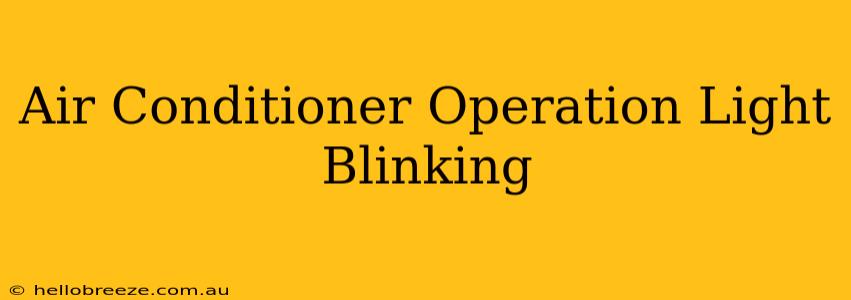Is your air conditioner's operation light blinking? This isn't just a minor inconvenience; it's often a signal that something needs attention. A blinking light usually indicates a specific problem with your AC unit, and understanding what that blink code means can save you time, money, and potential frustration. This comprehensive guide will walk you through troubleshooting common air conditioner operation light blinking issues.
Understanding Your Air Conditioner's Blinking Codes
Air conditioner manufacturers use blinking lights as a diagnostic tool. The pattern of blinks – the number of blinks, pauses, and repetitions – often corresponds to a specific error code. Unfortunately, there's no universal standard, so the meaning varies significantly depending on your AC unit's brand and model.
First things first:
-
Consult your owner's manual: This is the most crucial step. Your manual should have a section dedicated to troubleshooting, including a table explaining the meaning of different blinking light patterns.
-
Identify the light: Note precisely which light is blinking (e.g., power light, fan light, diagnostic light). Many AC units have multiple lights, each conveying distinct information.
-
Record the blinking pattern: Carefully count the number of blinks, the pauses between blinks, and how many times the pattern repeats itself. Write this down – it's your key to understanding the problem.
Common Blinking Light Issues and Their Possible Causes
While the exact meaning of blinking lights depends on your specific model, here are some common problems associated with blinking AC lights:
-
Frozen Evaporator Coil: A common culprit. This often leads to a blinking light indicating a low airflow problem. This may be caused by restricted airflow due to a dirty filter, frozen coils, or a malfunctioning blower motor. Solution: Check and clean or replace the air filter. If the coils are frozen, turn off the unit and allow them to thaw completely before restarting.
-
Refrigerant Leaks: A serious issue that necessitates professional attention. Refrigerant leaks lead to poor cooling and can damage the compressor. A blinking light may indicate low refrigerant levels. Solution: Call a qualified HVAC technician immediately. Do not attempt to repair this yourself.
-
Compressor Problems: The compressor is the heart of your AC unit. A failing compressor often triggers a blinking light. This is usually indicated by a complete lack of cooling or erratic operation. Solution: You'll need an HVAC technician to diagnose and repair or replace the compressor.
-
Electrical Problems: Faulty wiring, a tripped breaker, or a blown fuse can cause the operation light to blink erratically. Solution: Check your breaker box for tripped breakers and replace any blown fuses. If the problem persists, contact an electrician.
-
Sensor Malfunctions: Various sensors monitor your AC's performance. A malfunctioning sensor can trigger a blinking light, indicating false errors. Solution: An HVAC technician is needed to identify and replace the faulty sensor.
-
Drainage Issues: Clogged drain lines can lead to water buildup and affect your AC's operation, sometimes resulting in a blinking light. Solution: Check and clean the condensate drain line. If you are uncomfortable doing this yourself, call a professional.
Preventing Future Blinking Light Issues
Regular maintenance is your best defense against AC problems and blinking light codes.
-
Change your air filter regularly: This is the single most important preventative measure. A dirty filter restricts airflow, reducing efficiency and potentially leading to frozen coils.
-
Schedule annual professional maintenance: An HVAC technician can identify potential problems early, preventing major breakdowns and costly repairs. This includes inspecting the refrigerant levels, checking electrical components, and cleaning the coils.
-
Keep the area around your unit clear: Ensure proper ventilation and airflow around the outdoor unit.
When to Call a Professional
If you've tried the basic troubleshooting steps and the blinking light persists, don't hesitate to call a qualified HVAC technician. Attempting to repair your air conditioner yourself without proper knowledge can lead to further damage and safety hazards. A professional can accurately diagnose the problem and perform the necessary repairs safely and efficiently. This will ensure your system is working optimally, maintaining a comfortable temperature and extending the lifespan of your air conditioning system.

